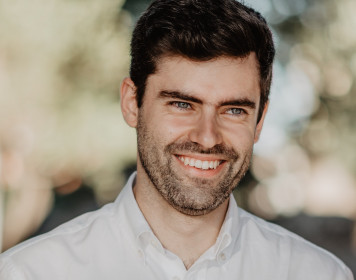
Miguel Fuzeta
Postdoc
I hold a MSc in Biological Engineering, and a PhD in Bioengineering through the MIT Portugal Program, during which I developed a bioreactor system to scale up the production of extracellular vesicles engineered for cancer-targeted drug delivery. I am keen in continuing my career bridging science and engineering, but now applied to finding ways to better treat patients with metastatic breast cancer.
Latest Publications
Miguel de Almeida Fuzeta received his integrated MSc degree (BSc + MSc) in Biological Engineering from Instituto Superior Técnico, University of Lisbon in 2016. Miguel developed his Master’s thesis at the Champalimaud Foundation, supervised by Miguel Godinho Ferreira and Rita Fior, where he studied the interactions established between cancer cell populations in vivo using a zebrafish model. His thesis ultimately contributed for a study revealing a mechanism of innate immune evasion in colorectal cancer, as well as validating the application of zebrafish xenografts as living mimetics of the tumor microenvironment.
Miguel then joined the MIT Portugal PhD Program in Bioengineering in 2017 and developed his PhD thesis at the Stem Cell Engineering Research Group from Instituto Superior Técnico, supervised by Cláudia Lobato da Silva and Nuno Bernardes. His research work was developed in collaboration with iMM Lisboa, supervised by Diana Gaspar, as well as at UMC Utrecht in the Netherlands, in the laboratories of Joost Sluijter and Pieter Vader, where he worked as a visiting researcher in 2020. During his PhD, Miguel worked on the scalable production of extracellular vesicles (EVs) derived from mesenchymal stromal cells, and engineered those EVs for cancer-targeted drug delivery. In order to obtain a therapeutic product more readily translatable to the clinical setting, Miguel developed innovative bioreactor-based culture systems allowing the scalable manufacturing of EVs at higher yields. Finally, he established novel drug delivery systems for cancer therapy by combining EVs with cancer targeting peptides.
In September 2022, Miguel joined the Cancer Dormancy & Immunity Laboratory at the Champalimaud Foundation as a postdoctoral researcher, where he aims to elucidate tissue-specific barriers to metastasis through a multidisciplinary approach that blends his passion for both science and engineering.
In March 2024, Miguel left the lab to continue his career as a Postdoc in the group of Margarida Serra, at the iBET, in Oeiras, Portugal. Farewell Miguel!


